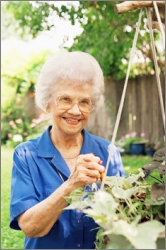Aging and Weight Gain: How NOT to Get Fatter as You Get Older
by www.SixWise.com
You may remember your childhood years fondly as a time of bike rides, endless summers, and visits from the tooth fairy. Among these many pleasures from your younger years was also a seemingly endless metabolism -- and with it the ability to eat as many hamburgers, ice cream sandwiches, French fries and slices of birthday cake as you pleased without gaining a pound.
|

There's good news: weight gain as you age is NOT inevitable.
|
Sadly, as you get older, you lose this ability to burn off the calories as quickly, therefore holding on to those cupcakes and cheeseburgers far longer than you'd probably like to, and often in places you surely don't want to, such as your belly, hips and thighs. This begs the question -- why do we get fatter as we get older, and more importantly, can it be avoided?
Aging and Weight Gain -- Inevitable?
While there is no question that we tend to gain weight as we grow older, the big question still remains as to why this weight gain occurs and whether or not it is inevitable. There have been many studies devoted to discovering the causes of this weight gain.
One such study was conducted by Monash University researcher Dr. Zane Andrews, a neuroendocrinologist with the university's department of physiology. This study uncovered that one of the reasons the scale creeps up as you get older is that appetite-suppressing cells are attacked by free radicals after eating -- and this degeneration is more significant following meals rich in carbohydrates and sugars.
People between the ages of 25 and 50 are most at risk according to Dr. Andrews, as the neurons that tell people in this crucial age range not to overeat are being killed off. This reduction in appetite-suppressing cells could be one explanation for the complexity of adult-onset obesity.
What is also a factor is that the modern diet has become increasingly filled with sugars and carbohydrates, which is leading to premature cell deterioration.
Another reason that we gain weight as we get older is that muscles turn to fat as we age, decreasing our muscle mass and increasing body fat. This happens at around 30, when both men and women experience an up to 40% reduction in both muscle and bone mass.
This change, which begins at age 30 and reaches a plateau at about 60 or 70, coincides with a decrease in our physical abilities, affecting reaction time and rate at which we perform tasks. This causes many people to become less physically active, which sabotages their efforts to remain slim, as exercising and maintaining an active lifestyle are crucial to keeping an elevated metabolic rate and winning the battle of the bulge.
|

If you're between the ages of 25 and 50, eating a lot of carbs and sugar may deteriorate your appetite-suppressing cells.
|
Studies have shown that both men and women experience these changes similarly. However, women tend to have more difficulty with the weight issue, particularly after menopause, which occurs between the late-40s and early 50s. Around this time, about 60% of women experience some sort of weight gain, usually about a pound a year, most of it accumulating around the stomach. This is particularly frustrating for women due to the fact that the hormonal and metabolic changes that occur during menopause make it difficult, if not impossible, to shed this weight.
Another explanation for growing heavier as we grow older is simple genetics. If you're lucky enough to have a mother or grandmother who was naturally slim, even in their golden years, you might stay that way too. However, if you have relatives who got heavier as they got older, then chances are you may too.
A Weighty Issue
While staying slim is certainly more difficult as you age, for many weight gain is beginning in the younger years. There has been a steady increase in obesity rates among Americans over the last 20 years, according to the Center for Disease Control (CDC). In fact, Colorado is the only state in the union that has a prevalence of obesity less than 20%! And in 2007, the overall obesity rate jumped to nearly 26%, which is up from 24% in 2005.
While these numbers are distressing enough, what is even more alarming is the rate at which America's children are joining the ever-growing ranks of the obese. Perhaps due to poor diets and more time than ever spent in front of video games, computers, and TV sets, American children are heavier than ever, putting them at risk for diseases typically reserved for adults, such as type 2 diabetes, heart disease and hypertension.
To help address this crises, the CDC has launched a campaign called "Healthy People 2010," which seeks to decrease the number of obese Americans down to 15% by the year 2010 through a program of nutritional education and motivating people to get out and exercise more. In addition, many states such as New York have banned the use of dangerous trans fats in restaurants and require them to place calorie and fat information in all their menus.
Schools across the nation have begun to take vending machines off campuses and many have banned sugary foods such as cupcakes and candy from parties. And many campaigns, such as Boston's Metrowest Community Healthcare Foundation , have been established with the goal of educating parents about the severity of the problem and encouraging them to get their children away from the video games and out exercising, as well as eating better foods. This advice, while good for children, will also help parents to establish healthier lifestyle habits and hopefully keep to a healthy weight even as they get older.
Taking a Load Off
While weight gain is more likely to happen as you get older, it is not inevitable. There are many things you can do to help fight off those extra pounds. Staying active is key. While it may be tempting to forego physical activity as you age and perhaps your body starts to ache a bit more, exercise is crucial to not only staying slimmer, but to living longer and healthier lives.
The more physically fit you are, the easier it is to fend off disease. Regular exercise not only boosts your immune system, but it's good for your mental well-being too. The endorphins that are released during exercise even help stave off depression and anxiety, common problems faced as we grow older.
Along with exercise, you may also need to reevaluate your diet as you get older. Changing eating habits is never easy, especially if they've been engrained over several decades, but it is necessary if you want to maintain a healthy weight. While it's never good to eat that extra slice of pie on a regular basis, it is particularly important as you get older to avoid these "danger" foods and replace them with foods that cater more to the body's changing nutritional needs. If you are unsure of how best to tweak your diet, there are plenty of nutritionists that are willing to help construct a diet plan that will fit your needs.
For most of us, staying slim is no easy task, especially as we grow older and our bodies start to change. However, getting older doesn't have to equal getting heavier. Taking a few simple steps can help increase your odds of staying slim well into your golden years.
Recommended Reading
What Really Causes the "Beer Belly" in Men and How to Get Rid of Your Gut
Aging Gracefully: Enjoy a Vital, Fulfilling Life Regardless of Age
Sources
Science Daily August 2008
CDC: U.S. Obesity Trends
TheBostonChannel.com